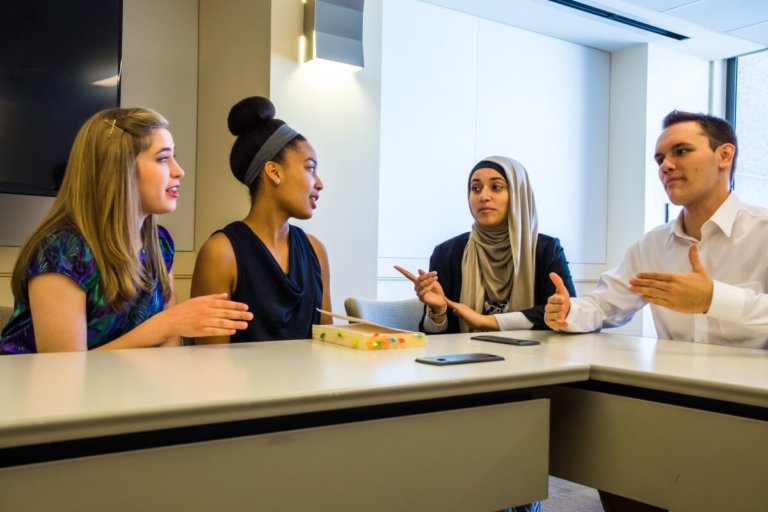
In US colleges and universities, Muslim freshmen are the most inclined to have a considerable number of religiously diverse friends, a new survey has found.
Most college students have at least one friend from a different religion, but among all racial groups, Muslim students reported the highest percentage of affiliation with five or more friends of different religious or secular identities.
“Muslims (79 percent), Jews (68 percent), Buddhists (57 percent), and atheists (55 percent) are the most inclined to have a considerable number of religiously diverse friends as they are beginning their first term on campus,” according to the study, conducted by the Interfaith Youth Core. Overall, only 47 percent of first-term students report having five or more interworldview friends.
The racial groups with the three lowest percentage of students with a religiously diverse set of friends are: Mormons (28.3 percent), Mainline Protestants (42.9 percent) and Evangelical Christians (43.1 percent).
“In sum, most students come to their campuses with some experience in bridging worldview divides through the friendships they cultivate.”
If they started college with a religiously diverse set of friends, they’re most likely to end their first year with more of such friendships too, according to the survey.
According to the most recent @IDEALSresearch report, 94% of students who started college with one to four interworldview friendships either maintained friendships at that level or made more. Learn more by downloading the full report today: https://t.co/1TJBCe5WgF pic.twitter.com/A9dAy021FJ
— InterfaithYouthCore (@ifyc) October 17, 2019
Alyssa Rockenbach, Professor of Higher Education at North Carolina State University and co-principal investigator on the survey, told Inside Higher Ed that maintaining or gaining more friends across world views “gives students more pluralistic mind-sets, which makes them well prepared to graduate college and contribute to their workplaces in more productive ways.”
The Interfaith Diversity Experiences and Attitudes Longitudinal Survey (IDEALS) report reflects the responses of 7,194 students at 122 diverse colleges and universities who responded to the first two IDEALS in 2015 and 2016. IDEALS is the first national study of its kind to focus on undergraduate students’ interactions with others of diverse worldviews and religions.
Why do Muslim and Jewish students have more religiously diverse friends? The report posits a range of factors, from growing up in religiously diverse communities where potential friends of other backgrounds are present in larger numbers, to being encouraged by their family or faith to reach across racial boundaries. It’s possible that they “proactively sought out friendships to learn about others’ worldviews and disrupt stereotypes”, too.
It’s the last factor that the study authors hope could help solve the problem of decreasing tolerance on college campuses. Gaining a friend from a different world view makes students view people of that demographic and of other worldviews more positively, the study also showed. This correlates with a 2014 Pew Research Center study which arrived at a similar finding: “Americans who know a member of a group tend to rate that group more positively”.
“For example, among those who know an atheist, the average rating of atheists is 50; among those who don’t know an atheist, it’s 29. And among those who know a Buddhist, the average rating of Buddhists is 70. The comparable rating by those who don’t know a Buddhist is 48,” the Center explained on its website.
It also found that college is a key factor in fostering such inter-religious relationships and the benefits that come with it. College graduates know, on average, members of five different religious groups – more than those with only a high school diploma education, or less.
Rockenbach said: “Something that has really started to emerge from our findings is the role of close friendships in helping students to have more positive attitudes toward others of different walks of life.
“The goal of this report was really to help us hone in on what those experiences are like for students and also the impact those friendships have.”
Liked this? Then you’ll love…
Friendship cliques encourage drinking among students, study says
Why international students should check out International Friendships, Inc







